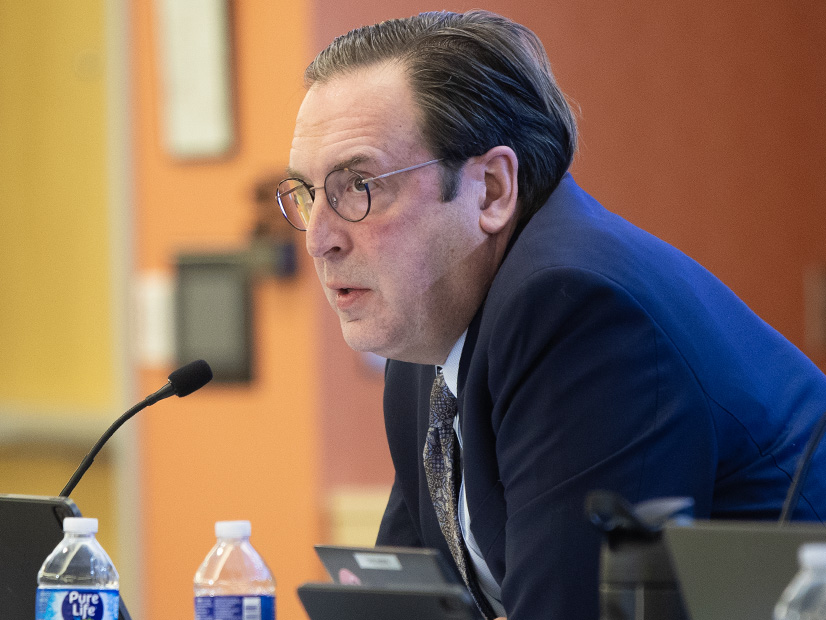
VALLEY FORGE, Pa. — PJM is in discussions with Pennsylvania Gov. Josh Shapiro to work toward a resolution on his complaint to FERC asking it to lower the price cap of the RTO’s capacity market, the Members Committee heard Jan. 23 (EL25-46).
The discussions also follow a letter Shapiro wrote to the PJM Board of Members requesting that it intervene to avoid an “unacceptable” $20.4 billion increase in capacity market prices or the commonwealth may “re-evaluate” its relationship with the RTO. (See Shapiro Warns of ‘Reevaluation’ of PJM if Capacity Prices not Addressed.)
PJM General Counsel Chris O’Hara told the committee that the discussions have included the design of a price cap, as well as the concept of a price floor. He said PJM also has emphasized to the governor that any market changes must consider the need to attract investment in the RTO while also balancing consumer rates.
“We want to make sure you are all aware of these discussions,” he told stakeholders.
Responding to questions on whether there is a timeline for PJM to reach a settlement or how the discussions interact with the schedule of the 2026/27 Base Residual Auction, O’Hara said the RTO is moving expeditiously. The auction is scheduled to be conducted in July and in several filings seeking to revise elements of the capacity market, PJM has requested orders by Feb. 21 to ensure it has time to implement the changes.
“We are aware of the auction schedule, and we are moving with haste, but there is no date certain,” he said.
Paul Sotkiewicz, president of E-Cubed Policy Associates, questioned if it was appropriate for PJM to be discussing market rules with a nonmember, particularly when the changes could affect all market participants. O’Hara responded that PJM will continue to have discussions with membership as well.
Shapiro requested the auction’s price cap be reset to 1.5 times the net cost of new entry (CONE); the status quo is the greater of gross CONE or 1.75 times net CONE. On Jan. 21, FERC granted a joint motion that Shapiro and PJM filed asking for a one-week extension on the RTO’s deadline to respond.
“The requested extension will allow the joint parties to engage in discussions concerning the complaint before any answers are filed,” they said in their motion.
PJM responded to Shapiro’s letter on Jan. 16, saying it has yet to take a position on the substance of his complaint.
“We share your concern for consumer cost increases resulting from the region’s supply/demand challenge,” PJM wrote. “We are simultaneously concerned about market changes that could serve to thwart new generation entry. This new entry is needed to preserve system reliability and ultimately reduce costs for consumers. PJM is very willing to have discussions about how these two concerns can simultaneously be addressed.”
Since Shapiro’s complaint was filed, the governors of Maryland, Delaware, Illinois and New Jersey also have sent letters to PJM and FERC urging action.
“As one of the original members of PJM, New Jersey has long worked in partnership with PJM to pioneer new and innovative approaches to provide our residents with reliable and affordable power, most recently exemplified with our work together on the State Agreement Approach,” Gov. Phil Murphy said in a Jan. 21 letter to the RTO. “That long partnership has become frayed in recent years as PJM continues to take actions that are incongruent with our energy policy and the best interests of our residents. I am calling on you to help repair that partnership and work with New Jersey and other interested states to resolve this matter.”
In his own letter, Maryland Gov. Wes Moore argued that a lower price cap is needed to prevent a growing affordability problem from worsening in the next capacity auction.
“I strongly urge you to make the requested adjustments to help contain costs to Maryland households, as well as households throughout PJM, particularly in light of the fact that the previous suite of changes to risk modeling and capacity accreditation developed under PJM’s Critical Issue Fast Path contributed to the results of the last auction,” he wrote.
On Jan. 17, Illinois Gov. JB Pritzker and former Delaware Gov. Bethany Hall-Long (whose term ended Jan. 21) joined Murphy and Moore in a letter to FERC arguing that the temporary change would contain auction prices, as barriers to new entry prevent resources from responding to high prices and a large number of rule changes are being considered by the commission.
“The proposed temporary modification to the price cap ensures that prices do not reach unjust and unreasonable levels despite the structural limitations in today’s marketplace preventing a pronounced market response to elevated prices,” they wrote. “This measure is also warranted given the unusually large number of emergency reforms PJM has proposed for the upcoming 2026/2027 auction, as well as the significant changes implemented in the 2025/2026 auction.”



